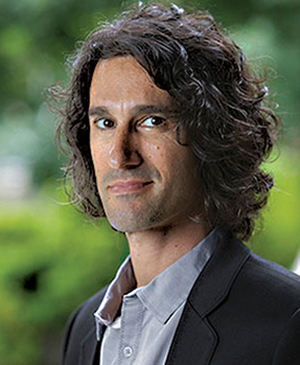 Agustín Fuentes
Agustín Fuentes
Agustín Fuentes, the Rev. Edmund P. Joyce, C.S.C., Endowed Chair in Anthropology, has been selected to deliver the 2018 Gifford Lectures at the University of Edinburgh in Scotland.
Founded by the jurist Adam Lord Gifford, the renowned lecture series invites pre-eminent scholars to address topics related to theology, philosophy, and science.
Fuentes is the second consecutive College of Arts and Letters faculty member to be chosen. Michael Rea, a professor in the Department of Philosophy, delivered the 2017 lectures at the University of St. Andrews.
The Gifford Lectures rotate between four Scottish universities — Edinburgh, Aberdeen, Glasgow, and St. Andrews — and, aside from three years during World War II, have been delivered annually since 1888.
“Of my entire academic experience, it is both the most honorific and the most humbling,” Fuentes said. “I am unbelievably honored to be delivering a lecture of such prominence in the shadow of so many amazing scholars. And it gives me an opportunity and a platform to do exactly the kind of difficult, meaningful work that every academic dreams of.”
Fuentes will present the six-lecture series, “Why We Believe: Evolution, Making Meaning, and the Development of Human Natures,” in February and March. The lectures, designed to be both scholarly and relatable to a broad, general audience, will be made available online and later adapted into a book.
“I am fascinated by the human capacity for belief — the ability to imagine, to make meaning in the world, and to hope and believe in things that are more than just physical experience,” he said.
“We can imagine new realities that are not based on experience or the materials around us and try to make them happen. That’s amazing. And one of the most telling aspects of that capacity is the capacity to be religious and have religious faith.”
The lectures draw on Fuentes’ recent research, including his latest book, The Creative Spark: How Imagination Made Humans Exceptional and the transdisciplinary Human Distinctiveness project he is leading with Celia Deane-Drummond, a professor of theology.
“I think combining studies of human evolution, genetics, and brain development, alongside philosophical and theological inquiry gives us much more complicated, but much more interesting, answers than any one of those by itself. We’ve gotten so good at being specialized in a particular area that we’ve started to lose sight of the whole point of the academy — these big, integrative, synthetic questions that matter to humanity.
“I’ve been blessed to have the opportunity to collaborate with great colleagues at Notre Dame and around the world, including anthropologists, theologians, philosophers, biologists, and evolutionary theorists,” Fuentes said. “If I had been at any other institution, I probably wouldn’t have this opportunity. I would not have had access to and support in doing the kind of integrative work that I’m doing.”
Fuentes said that type of transdisciplinary research over the last decade has caused him to start seeing larger-picture questions.
“I think combining studies of human evolution, genetics, and brain development alongside philosophical and theological inquiry gives us much more complicated, but much more interesting, answers than any one of those by itself,” he said. “We’ve gotten so good at being specialized in a particular area that we’ve started to lose sight of the whole point of the academy — these big, integrative, synthetic questions that matter to humanity.
“And that’s what the Gifford Lectures are all about — the opportunity for scholars to talk about religion and nature and humans, without any constraints. That’s how we learn.”


